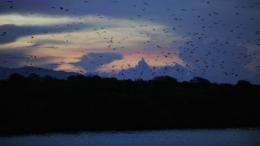This file photo shows a swarm of fruit bats. Millions of fruit bats are flocking to a cave sanctuary on a small Philippine island and reproducing wildly as humans become an increasing threat to other nearby habitats, according to a conservationist.
Millions of fruit bats are flocking to a cave sanctuary on a small Philippine island and reproducing wildly as humans become an increasing threat to other nearby habitats, according to a conservationist.
Biologists have been surprised by the bats as they seem to be breeding all year round and not just in their regular April to July season, said Norma Monfort, who heads a conservation foundation that manages the sanctuary.
"The cave is overflowing. The bats are on the ground, they are out in the open, which is very unusual. The bats are delivering (babies) all year round," Monfort told AFP on Monday.
An estimated two million bats are crowding inside the 300-metre (1,000-foot) long "Monfort Bat Cave" on the southern island of Samal, said Monfort, whose family owns the property where the cave is located.
The overcrowding has become so bad that male bats are often seen attacking baby bats, said Monfort.
Monfort said the bats were apparently seeking refuge in her cave because people were hunting the animals for food or harvesting bat guano in other habitats.
"They will get bats by the sackload because they say they are a good source of protein," she said.
Other caves on Samal that used to house many bats are now largely empty, according to Monfort.
Monfort said the bat numbers have been building since 2006, when she created the sanctuary.
Guinness World Records said last year the sanctuary may qualify as the having largest colony of Geoffroy's Rousette Fruit Bats.
(c) 2011 AFP


















